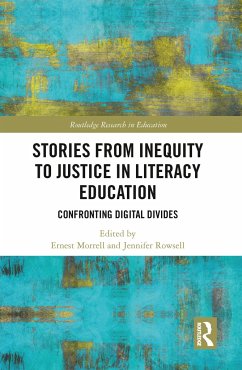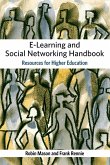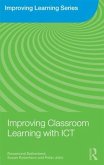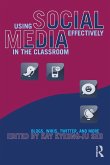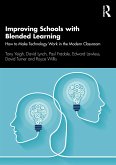Stories from Inequity to Justice in Literacy Education
Confronting Digital Divides
Herausgeber: Morrell, Ernest; Rowsell, Jennifer
Stories from Inequity to Justice in Literacy Education
Confronting Digital Divides
Herausgeber: Morrell, Ernest; Rowsell, Jennifer
- Broschiertes Buch
- Merkliste
- Auf die Merkliste
- Bewerten Bewerten
- Teilen
- Produkt teilen
- Produkterinnerung
- Produkterinnerung
Challenging the assumption that access to technology is pervasive and globally balanced, this book explores the real and potential limitations placed on young people's literacy education by their limited access to technology and digital resources.
Andere Kunden interessierten sich auch für
![The Business Side of Learning Design and Technologies The Business Side of Learning Design and Technologies]() Shahron Williams van RooijThe Business Side of Learning Design and Technologies75,99 €
Shahron Williams van RooijThe Business Side of Learning Design and Technologies75,99 €![Integrating Computer Science Across the Core Integrating Computer Science Across the Core]() Tom Liam LynchIntegrating Computer Science Across the Core43,99 €
Tom Liam LynchIntegrating Computer Science Across the Core43,99 €![e-Learning and Social Networking Handbook e-Learning and Social Networking Handbook]() Frank Renniee-Learning and Social Networking Handbook61,99 €
Frank Renniee-Learning and Social Networking Handbook61,99 €![Improving Classroom Learning with ICT Improving Classroom Learning with ICT]() Rosamund SutherlandImproving Classroom Learning with ICT59,99 €
Rosamund SutherlandImproving Classroom Learning with ICT59,99 €![Policy for Open and Distance Learning Policy for Open and Distance Learning]() Helen Lentell / Hilary Perraton (eds.)Policy for Open and Distance Learning86,99 €
Helen Lentell / Hilary Perraton (eds.)Policy for Open and Distance Learning86,99 €![Using Social Media Effectively in the Classroom Using Social Media Effectively in the Classroom]() Kay SeoUsing Social Media Effectively in the Classroom67,99 €
Kay SeoUsing Social Media Effectively in the Classroom67,99 €![Improving Schools with Blended Learning Improving Schools with Blended Learning]() Tony YeighImproving Schools with Blended Learning51,99 €
Tony YeighImproving Schools with Blended Learning51,99 €-
-
-
Challenging the assumption that access to technology is pervasive and globally balanced, this book explores the real and potential limitations placed on young people's literacy education by their limited access to technology and digital resources.
Produktdetails
- Produktdetails
- Verlag: Taylor & Francis
- Seitenzahl: 228
- Erscheinungstermin: 31. März 2021
- Englisch
- Abmessung: 229mm x 152mm x 12mm
- Gewicht: 308g
- ISBN-13: 9780367785512
- ISBN-10: 036778551X
- Artikelnr.: 61209992
- Herstellerkennzeichnung
- Libri GmbH
- Europaallee 1
- 36244 Bad Hersfeld
- gpsr@libri.de
- Verlag: Taylor & Francis
- Seitenzahl: 228
- Erscheinungstermin: 31. März 2021
- Englisch
- Abmessung: 229mm x 152mm x 12mm
- Gewicht: 308g
- ISBN-13: 9780367785512
- ISBN-10: 036778551X
- Artikelnr.: 61209992
- Herstellerkennzeichnung
- Libri GmbH
- Europaallee 1
- 36244 Bad Hersfeld
- gpsr@libri.de
Jennifer Rowsell is the Canada Research Chair in Multiliteracies at Brock University, Canada. Ernest Morrell is the Coyle Professor of Literacy Education and the Director of the Notre Dame Center for Literacy Education at the University of Notre Dame, USA.
Chapter 1 - Introduction: Moving stories of inequity to stories of justice Jennifer Rowsell
University of Bristol
UK & Ernest Morrell
University of Notre Dame
USA Section 1: Macro perspectives: Big gaps
divides
and inequities Chapter 2 - Searching for mermaids: Access
capital and the digital divide in a rural South African Primary School Kerryn Dixon
University of the Witwatersrand
South Africa Chapter 3 - Divided digital practices: A story from Indigenous Australia Inge Kral
The Australian National University
Australia Chapter 4 - Storylines: Young people playing into change in agricultural colleges in Rural Ethiopia to address sexual and gender based violence Hani Sadati
Claudia Mitchell & Lisa Starr
McGill University
Canada Section 2: Meso perspectives: Making it work on the margins Chapter 5 - Reframing the digital in literacy: Youth
arts
and misperceptions Mia Perry
University of Glasgow
UK
Diane R. Collier
Brock University
Canada & Jennifer Rowsell
University of Bristol
UK Chapter 6 - The potential of participatory literacies to challenge digital (civic) divides Nicole Mirra
Rutgers University
USA & Antero Garcia
Stanford University
USA Chapter 7 - Youth people's media use and social participation in Hong Kong: A perspective of digital use divide Alice Y. L. Lee
Hong Kong Baptist University
China & Klavier J. Wang
The Education University of Hong Kong
China Chapter 8 - From mothballed to meaningfully-used technology in Urban Catholic Schools Nate Wills
University of Notre Dame
USA Section 3: Micro perspectives: Race and social class digital divides in communities Chapter 9 - Social class
literacies
and digital wastelands: Technological artifacts in a network of relations Stephanie Jones & Jaye Johnson Thiel
University of Georgia
USA Chapter 10 - Values
neoliberalism
and the digital divide: Nonwhite media makers and the production of meaning Zithri Saleem & Negin Dahya
University of Washington
USA Chapter 11 - Making it work in the Global South: Stories of digital divides in a Brazilian context Cristiane Manzan Perine
Federal University of Uberlândia
Brazil & Jennifer Rowsell
University of Bristol
UK Afterword
University of Bristol
UK & Ernest Morrell
University of Notre Dame
USA Section 1: Macro perspectives: Big gaps
divides
and inequities Chapter 2 - Searching for mermaids: Access
capital and the digital divide in a rural South African Primary School Kerryn Dixon
University of the Witwatersrand
South Africa Chapter 3 - Divided digital practices: A story from Indigenous Australia Inge Kral
The Australian National University
Australia Chapter 4 - Storylines: Young people playing into change in agricultural colleges in Rural Ethiopia to address sexual and gender based violence Hani Sadati
Claudia Mitchell & Lisa Starr
McGill University
Canada Section 2: Meso perspectives: Making it work on the margins Chapter 5 - Reframing the digital in literacy: Youth
arts
and misperceptions Mia Perry
University of Glasgow
UK
Diane R. Collier
Brock University
Canada & Jennifer Rowsell
University of Bristol
UK Chapter 6 - The potential of participatory literacies to challenge digital (civic) divides Nicole Mirra
Rutgers University
USA & Antero Garcia
Stanford University
USA Chapter 7 - Youth people's media use and social participation in Hong Kong: A perspective of digital use divide Alice Y. L. Lee
Hong Kong Baptist University
China & Klavier J. Wang
The Education University of Hong Kong
China Chapter 8 - From mothballed to meaningfully-used technology in Urban Catholic Schools Nate Wills
University of Notre Dame
USA Section 3: Micro perspectives: Race and social class digital divides in communities Chapter 9 - Social class
literacies
and digital wastelands: Technological artifacts in a network of relations Stephanie Jones & Jaye Johnson Thiel
University of Georgia
USA Chapter 10 - Values
neoliberalism
and the digital divide: Nonwhite media makers and the production of meaning Zithri Saleem & Negin Dahya
University of Washington
USA Chapter 11 - Making it work in the Global South: Stories of digital divides in a Brazilian context Cristiane Manzan Perine
Federal University of Uberlândia
Brazil & Jennifer Rowsell
University of Bristol
UK Afterword
Chapter 1 - Introduction: Moving stories of inequity to stories of justice Jennifer Rowsell
University of Bristol
UK & Ernest Morrell
University of Notre Dame
USA Section 1: Macro perspectives: Big gaps
divides
and inequities Chapter 2 - Searching for mermaids: Access
capital and the digital divide in a rural South African Primary School Kerryn Dixon
University of the Witwatersrand
South Africa Chapter 3 - Divided digital practices: A story from Indigenous Australia Inge Kral
The Australian National University
Australia Chapter 4 - Storylines: Young people playing into change in agricultural colleges in Rural Ethiopia to address sexual and gender based violence Hani Sadati
Claudia Mitchell & Lisa Starr
McGill University
Canada Section 2: Meso perspectives: Making it work on the margins Chapter 5 - Reframing the digital in literacy: Youth
arts
and misperceptions Mia Perry
University of Glasgow
UK
Diane R. Collier
Brock University
Canada & Jennifer Rowsell
University of Bristol
UK Chapter 6 - The potential of participatory literacies to challenge digital (civic) divides Nicole Mirra
Rutgers University
USA & Antero Garcia
Stanford University
USA Chapter 7 - Youth people's media use and social participation in Hong Kong: A perspective of digital use divide Alice Y. L. Lee
Hong Kong Baptist University
China & Klavier J. Wang
The Education University of Hong Kong
China Chapter 8 - From mothballed to meaningfully-used technology in Urban Catholic Schools Nate Wills
University of Notre Dame
USA Section 3: Micro perspectives: Race and social class digital divides in communities Chapter 9 - Social class
literacies
and digital wastelands: Technological artifacts in a network of relations Stephanie Jones & Jaye Johnson Thiel
University of Georgia
USA Chapter 10 - Values
neoliberalism
and the digital divide: Nonwhite media makers and the production of meaning Zithri Saleem & Negin Dahya
University of Washington
USA Chapter 11 - Making it work in the Global South: Stories of digital divides in a Brazilian context Cristiane Manzan Perine
Federal University of Uberlândia
Brazil & Jennifer Rowsell
University of Bristol
UK Afterword
University of Bristol
UK & Ernest Morrell
University of Notre Dame
USA Section 1: Macro perspectives: Big gaps
divides
and inequities Chapter 2 - Searching for mermaids: Access
capital and the digital divide in a rural South African Primary School Kerryn Dixon
University of the Witwatersrand
South Africa Chapter 3 - Divided digital practices: A story from Indigenous Australia Inge Kral
The Australian National University
Australia Chapter 4 - Storylines: Young people playing into change in agricultural colleges in Rural Ethiopia to address sexual and gender based violence Hani Sadati
Claudia Mitchell & Lisa Starr
McGill University
Canada Section 2: Meso perspectives: Making it work on the margins Chapter 5 - Reframing the digital in literacy: Youth
arts
and misperceptions Mia Perry
University of Glasgow
UK
Diane R. Collier
Brock University
Canada & Jennifer Rowsell
University of Bristol
UK Chapter 6 - The potential of participatory literacies to challenge digital (civic) divides Nicole Mirra
Rutgers University
USA & Antero Garcia
Stanford University
USA Chapter 7 - Youth people's media use and social participation in Hong Kong: A perspective of digital use divide Alice Y. L. Lee
Hong Kong Baptist University
China & Klavier J. Wang
The Education University of Hong Kong
China Chapter 8 - From mothballed to meaningfully-used technology in Urban Catholic Schools Nate Wills
University of Notre Dame
USA Section 3: Micro perspectives: Race and social class digital divides in communities Chapter 9 - Social class
literacies
and digital wastelands: Technological artifacts in a network of relations Stephanie Jones & Jaye Johnson Thiel
University of Georgia
USA Chapter 10 - Values
neoliberalism
and the digital divide: Nonwhite media makers and the production of meaning Zithri Saleem & Negin Dahya
University of Washington
USA Chapter 11 - Making it work in the Global South: Stories of digital divides in a Brazilian context Cristiane Manzan Perine
Federal University of Uberlândia
Brazil & Jennifer Rowsell
University of Bristol
UK Afterword

